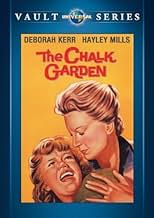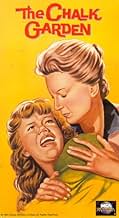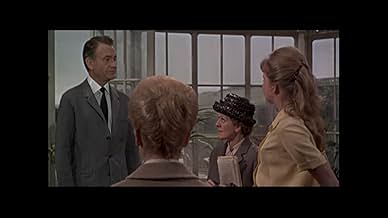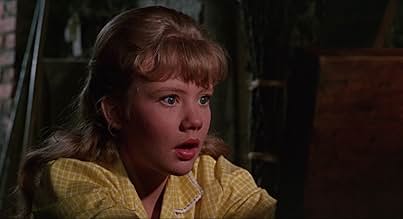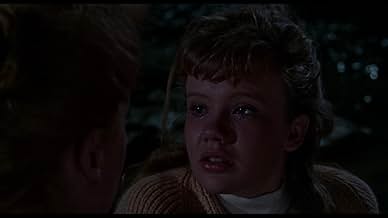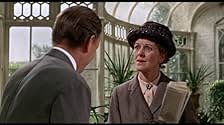Füge eine Handlung in deiner Sprache hinzuAn elderly woman hires a governess with a mysterious past to look after her disturbed, spoiled teenage granddaughter, who eventually understands the meaning of self-sacrifice as an example o... Alles lesenAn elderly woman hires a governess with a mysterious past to look after her disturbed, spoiled teenage granddaughter, who eventually understands the meaning of self-sacrifice as an example of love and grows into a better person.An elderly woman hires a governess with a mysterious past to look after her disturbed, spoiled teenage granddaughter, who eventually understands the meaning of self-sacrifice as an example of love and grows into a better person.
- Regie
- Drehbuch
- Hauptbesetzung
- Für 1 Oscar nominiert
- 3 Gewinne & 6 Nominierungen insgesamt
Empfohlene Bewertungen
This is a lovely combination of real-life father, John Mills, in a fine supporting role, and Deborah Kerr as the well-meaning but beleaguered governess. Many scenes are emotionally intense yet so well acted that we are swept along in the story. The tangled threads of family relationships is gradually sorted out and priorities are set aright after much confusion and willfulness particularly in the obstinacy of the grandmother (Edith Evans), who performs with great dramatic vehemence near the conclusion. A touching, human story, a great play.
The movie is set on the steep chalky-white cliffs of Southern England where an elderly lady, Mrs. St. Maugham (Edith Evans), lives with her 16-year-old granddaughter, Laurel (Hayley Mills), after Laurel's mother had divorced her father and the father died. Mrs. St. Maugham is in the process of hiring a new governess, Miss Madrigal (Deborah Kerr), while fighting with her daughter, Olivia (Elizabeth Sellars), over legal custody of Laurel. In spite of giving no references, Miss Madrigal totally wins over Mrs. St. Maugham and is hired as Laurel's governess.
The situation that Miss Madrigal walks into is very unconventional. The butler, Maitland (John Mills), is formal but far from non-observant or cold. Laurel is a cold-blooded, obnoxious brat who seems to have control of everyone around her and is tolerated, if not encouraged, for her precocious snobbishness. She enjoys shocking people and has Miss Madrigal in her sights as the next victim in a long line of governesses unable to control her. But, Madrigal is no pushover, and Laurel has her work cut out for her before getting rid of THIS governess.
As the movie progresses, there is sort of a back-and-forth psychological game between Laurel's attempt to unearth something about Madrigal's past (so that she can get rid of her) and Madrigal's trying to learn more about Laurel's problems so she can help her. Laurel tries to play private detective by looking for incriminating evidence against Miss Madrigal. She notices that all of Madrigal's clothes (and her luggage) are new; that she has no visitors or phone calls; that she never writes or receives letters; and that she has no family photos to place on her dressing table. Laurel also notices that Miss Madrigal never locks her door for privacy until Maitland suggests it and buys a good padlock for her. Laurel's curiosity gets the best of her, and she breaks into Miss Madrigal's room to try to find something on her. But she fails.
One evening in a conversation with Maitland, Miss Madrigal learns--or should I say confirms--that Laurel is a habitual liar: she learns this as she checks out several things that Laurel had told her. This seems to be troubling to her since she sees some of her own past in Laurel— something that shows Laurel's need to be loved and manifests this need by controlling people—keeping them away.
Things come to a head when Mrs. St. Maugham's 'former mistress,' Judge McWhirrey, 'puppy' (Felix Aylmer), comes to visit the house before judging a murder case in London. While at the super table, Laurel, fascinated by true crime cases, asks him to describe, in detail, what a murder case is like. Real criminal cases are a passion that she and Maitland enjoy sharing. Judge McWhirrey's description is very upsetting to Miss Madrigal and eventually leads to the final outcome of the movie.
While watching this movie, it is very easy to forget that John and Hayley Mills were a real-life father and daughter team. John puts up with Hayley's spoiled child role. At times, Hayley seems like she is overplaying her role, as she might have in a Disney movie, but there can be nothing subtle about Laurel, and she can't be played subtlety. In fact, she plays a child trying to pretend that she is an adult. The child side of her is captured in a couple scenes where she thinks she is not being watched: one with a childhood doll and another where she builds a sandcastle on the beach only to kick it over angrily when Miss Madrigal comes along to admire it. The scene on the steps (near the end of the movie) where Maitland and Laurel confront each other is powerful stuff and deserves nothing but kudos from the father-daughter acting duo. Overall, this is a good movie that deserves to be restored on DVD so that it can reach a wider audience.
Mills has a rather impressive collection of movies to her credit. She deserves much more respect than she has received.
Hayley Mills was known for "cute" roles by this point, so her role as Laurel was a real departure; the character reminded me of Parker Posey's character in "The House of Yes". Deborah Kerr naturally turned in a solid performance as the governess. John Mills as the dad didn't make much of an impression on me, but Edith Evans (in an Oscar-nominated performance) as the grandmother is enough to chill anyone's bones. Director Ronald Neame went on to helm "The Prime of Miss Jean Brodie" and "The Poseidon Adventure".
All in all, worth seeing.
Wusstest du schon
- WissenswertesGladys Cooper was originally named to play the role of Mrs. St. Maugham (which was eventually played by Dame Edith Evans). Evans, who had originally played the role on stage, very much wanted the movie role and had director Ronald Neame take her to meet producer Ross Hunter at Claridges Hotel. As Evans won the producer over, she got the part.
- PatzerThe wall clock in the kitchen where Laurel, Miss Madrigal, and Maitland discuss the judge's visit changes from 9:30 to 6:30 between shots.
- Zitate
[last lines]
Mrs. St. Maugham: [on the verge of tears] Is it a crime to want to be remembered?
Miss Madrigal: No. The Pharaohs built the pyramids for that reason.
Mrs. St. Maugham: What do women do in my case?
Miss Madrigal: It wouldn't hurt to go on gardening.
Mrs. St. Maugham: Have I've a muddle of my garden... and my heart? Will Olivia forgive me?
Miss Madrigal: In time, perhaps.
Mrs. St. Maugham: Would you stay with me? Would you?
Miss Madrigal: I'll stay... as long as I'm wanted. You know, we could make this place so full of life - a good life - and people would come from everywhere to see us. What do you think?
Mrs. St. Maugham: I must know one thing.
Miss Madrigal: What's that?
Mrs. St. Maugham: Did you do it?
Miss Madrigal: What many learned men at the top of their profession couldn't find out after a long, long trial. Why should you know.
Mrs. St. Maugham: Forty years ago, I should have said the same thing, but I warn you, before I die, I'll find out.
[the two walk off together]
- VerbindungenReferenced in What's My Line?: Louis Armstrong (2) (1964)
Top-Auswahl
- How long is The Chalk Garden?Powered by Alexa
Details
- Erscheinungsdatum
- Herkunftsländer
- Sprache
- Auch bekannt als
- The Chalk Garden
- Drehorte
- Clapham House, Clapham Lane, Litlington, East Sussex, Vereinigtes Königreich(House exteriors and garden)
- Produktionsfirmen
- Weitere beteiligte Unternehmen bei IMDbPro anzeigen
- Laufzeit1 Stunde 46 Minuten
- Farbe
- Seitenverhältnis
- 1.85 : 1
Zu dieser Seite beitragen



